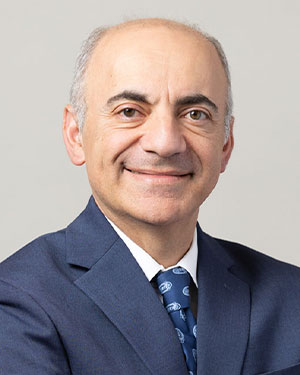Ramin Davidoff, MD, on value-based care and how it benefits older adults.
Dr. Parodi on the pros and cons of AI in health care

While the benefits of artificial intelligence in health care are game-changing, there are real concerns about how and when to use it. In a recent AMA Update podcast, Stephen Parodi, MD, executive vice president of External Affairs, Communications and Brand at The Permanente Federation, discussed the pros and cons of AI in health care. He shared how the technology is improving outcomes and efficiency at Kaiser Permanente and noted the potential pitfalls to consider. Dr. Parodi emphasized the need for physicians to drive the AI in health care conversation and help ensure that the technology works to serve the people using it — not the other way around.
Dr. Parodi provided examples of how Kaiser Permanente is already implementing algorithms and machine learning to improve population health. He cited the Advanced Alert Monitor program, an early-warning system that identifies patients at high risk of adverse events. “It actually gives us insight into patients at risk of clinical deterioration,” said Dr. Parodi. “And what’s important is that AI is not acting on its own. It’s really augmenting our practice.”
Related AI in health care story: Kaiser Permanente sponsors real-world demonstrations of AI machine learning in health care
He also talked about how Permanente physicians are using AI in radiology to help early detection of cancers and ambient AI during patient visits to generate notes. These examples demonstrate how clinicians can use AI to accelerate accurate diagnoses and save hours of documentation time.
Recommendations for the responsible use of AI
For all the demonstrated upside, AI is not without criticism. Concerns that many share about AI include privacy issues, regulatory requirements, and the potential to inadvertently introduce biases into health care practices.
“We want to make sure that we don’t introduce unintended biases into our practice because of predisposing assumptions that are in an electronic health record that AI is scraping,” said Dr. Parodi. “We’ve got to have processes in place for making sure that we do have equity and that, if we see inequities, that we correct for them.”
To help address these concerns, Dr. Parodi emphasized the need for governance and dialogue within medical groups, hospitals, and health plan partners for the safe and effective use of AI. He suggests open conversations with physicians and patients to ensure everyone is aware of how AI is used.
“It’s not as simple as just introducing it into the milieu,” said Dr. Parodi. “You actually have to then make sure that you’re monitoring it. Meaning the humans are monitoring the AI and the application of it.”
Related AI in health care story: Less desktop, more bedside: Using augmented intelligence to accelerate health care innovation
Ensuring that physicians are driving the conversation
Finally, Dr. Parodi encourages physician engagement with medical societies and policymakers to ensure their voices are heard when it comes time to shape AI policies and regulations. “Being able to provide those real-world stories … about what good looks like, what good governance looks like within an organization, to show that actually we in health care are aware of the issues … that’s going to be really important,” he said.
Note: Watch the full AMA Update podcast here.


